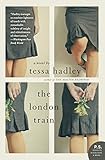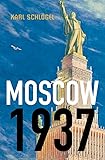 I don’t tend to read a lot of new English-language fiction. This isn’t from any sort of prejudice; it’s a side effect of the fact that I’m trying to go through the entirety of Russian literature, which takes up most of my available reading time. Fortunately, my writer friend Jim Salant occasionally forces me to get out of my Russian rut and experience a book he’s enthusiastic about, and most recently this was Tessa Hadley’s novel The London Train (P.S.). I wasn’t familiar with Hadley (and as of this writing she doesn’t have a Wikipedia article to her name), but by the time I got to the end of the first paragraph (“On the wall behind her desk was pinned a colorful year planner, almost every square scribbled over with busyness and responsibility: he imagined a space on the planner where his mother’s occupation of her room abutted abruptly onto blankness”) I was entirely willing to put myself into her hands and go where she wanted to take me. Her characters are drawn with clear-eyed affection, her prose is endlessly pleasurable without needlessly calling attention to itself, and she has a daring way of constructing a book (the “P.S.” in the title serves as a warning) that makes for an unexpected and enjoyable ride. When I finished it, I liked it so much I wanted to experience it again, so I read it to my wife. Hadley also writes short stories (I’ve since read a memorable one in the New Yorker), and I look forward to reading more of her work.
I don’t tend to read a lot of new English-language fiction. This isn’t from any sort of prejudice; it’s a side effect of the fact that I’m trying to go through the entirety of Russian literature, which takes up most of my available reading time. Fortunately, my writer friend Jim Salant occasionally forces me to get out of my Russian rut and experience a book he’s enthusiastic about, and most recently this was Tessa Hadley’s novel The London Train (P.S.). I wasn’t familiar with Hadley (and as of this writing she doesn’t have a Wikipedia article to her name), but by the time I got to the end of the first paragraph (“On the wall behind her desk was pinned a colorful year planner, almost every square scribbled over with busyness and responsibility: he imagined a space on the planner where his mother’s occupation of her room abutted abruptly onto blankness”) I was entirely willing to put myself into her hands and go where she wanted to take me. Her characters are drawn with clear-eyed affection, her prose is endlessly pleasurable without needlessly calling attention to itself, and she has a daring way of constructing a book (the “P.S.” in the title serves as a warning) that makes for an unexpected and enjoyable ride. When I finished it, I liked it so much I wanted to experience it again, so I read it to my wife. Hadley also writes short stories (I’ve since read a memorable one in the New Yorker), and I look forward to reading more of her work.
 My great find in the field of Russian history this year was Karl Schlögel’s Moscow, 1937, which immerses you in just about every imaginable aspect of that place and time, from construction projects to literature to music (jazz, pop, and Shostakovich) to the brand-new Gorky Park to the unstoppable, unmanageable flood of people from the starving countryside to the capital, where at least there was the hope of a job in one of the many new factories and therefore of survival. It’s the kind of blend of literary, cultural, and political history, with constant references to geography (and a nice annotated map of Moscow on the endpapers), that I love. If you want to understand the era of the great purges, this is one of the first books I would recommend.
My great find in the field of Russian history this year was Karl Schlögel’s Moscow, 1937, which immerses you in just about every imaginable aspect of that place and time, from construction projects to literature to music (jazz, pop, and Shostakovich) to the brand-new Gorky Park to the unstoppable, unmanageable flood of people from the starving countryside to the capital, where at least there was the hope of a job in one of the many new factories and therefore of survival. It’s the kind of blend of literary, cultural, and political history, with constant references to geography (and a nice annotated map of Moscow on the endpapers), that I love. If you want to understand the era of the great purges, this is one of the first books I would recommend.
My understanding of Russian literature and its history was shaken up by Muireann Maguire’s Stalin’s Ghosts: Gothic Themes in Early Soviet Literature; I had never given a thought to that side of Soviet literature, and I doubt many people have, but she convinced me that (as she puts it) “The centrality of the Gothic-fantastic to Russian fiction is almost impossible to exaggerate.” If you’re interested in, say, Bulgakov or Platonov, you’ll want to understand this aspect of where they came from. And there’s a companion volume, the anthology Red Spectres, which provides eleven stories in the genre; the pick of the bunch are the two stories by Bulgakov and one by the relatively unknown Sigizmund Krzhizhanovsky, but they’re all good reading.
 As for Russian literature itself, in the course of working my way through the early nineteenth century I’ve come across any number of writers I think should be better known, and at the head of the pack is Alexander Veltman. Veltman was extremely popular in his heyday, he was one of the pioneers of Russian science fiction, both Tolstoy and Dostoevsky praised him (his Serdtse i dumka [Heart and head, 1838] was one of Dostoevsky’s favorite novels), and he’s tremendous fun to read. As far as I know, the only translation into English is Selected Stories, edited and translated by the late James J. Gebhard (Northwestern University Press, 1998), which I am hereby recommending, but I would urge any adventurous publishers out there to commission translations of his novels, starting with Strannik [The wanderer], which burst onto the somnolent Russian literary scene at the beginning of the 1830s and made its author instantly famous. It begins “This sedentary, monotonous life has grown wearisome; let us go, sir! — said I one day to myself — let us go a-traveling!” and whisks the reader off to Bessarabia and Bulgaria; it’s a war memoir, a travelogue, a fantasy, a dream of fair women, with poetry and ethnography tossed in. It explains its own wild discursiveness thus: “In everything, harmony arises from disharmony… Thoughts, opinions, speeches, deeds, all of life, everything is subject to this law.” Veltman clung stubbornly to that law, even after tastes changed in the 1840s and the Russian public started wanting serious novels of social realism with explicit points of view on serfdom, nihilism, and the like; he kept writing books where you couldn’t make out what was going on for a long time (in Koshchei bessmertny [Koshchei the immortal, 1833], there is no mention of Koshchei until the twelfth chapter), and you just had to hold on tight and trust to the author’s fertile mind and ever-lively prose. It’s postmodern fiction, is what it is, and I think the world has finally caught up with it. Any publisher who takes the plunge will not only be delighting readers and making money, they’ll be helping to rewrite the received history of Russian literature.
As for Russian literature itself, in the course of working my way through the early nineteenth century I’ve come across any number of writers I think should be better known, and at the head of the pack is Alexander Veltman. Veltman was extremely popular in his heyday, he was one of the pioneers of Russian science fiction, both Tolstoy and Dostoevsky praised him (his Serdtse i dumka [Heart and head, 1838] was one of Dostoevsky’s favorite novels), and he’s tremendous fun to read. As far as I know, the only translation into English is Selected Stories, edited and translated by the late James J. Gebhard (Northwestern University Press, 1998), which I am hereby recommending, but I would urge any adventurous publishers out there to commission translations of his novels, starting with Strannik [The wanderer], which burst onto the somnolent Russian literary scene at the beginning of the 1830s and made its author instantly famous. It begins “This sedentary, monotonous life has grown wearisome; let us go, sir! — said I one day to myself — let us go a-traveling!” and whisks the reader off to Bessarabia and Bulgaria; it’s a war memoir, a travelogue, a fantasy, a dream of fair women, with poetry and ethnography tossed in. It explains its own wild discursiveness thus: “In everything, harmony arises from disharmony… Thoughts, opinions, speeches, deeds, all of life, everything is subject to this law.” Veltman clung stubbornly to that law, even after tastes changed in the 1840s and the Russian public started wanting serious novels of social realism with explicit points of view on serfdom, nihilism, and the like; he kept writing books where you couldn’t make out what was going on for a long time (in Koshchei bessmertny [Koshchei the immortal, 1833], there is no mention of Koshchei until the twelfth chapter), and you just had to hold on tight and trust to the author’s fertile mind and ever-lively prose. It’s postmodern fiction, is what it is, and I think the world has finally caught up with it. Any publisher who takes the plunge will not only be delighting readers and making money, they’ll be helping to rewrite the received history of Russian literature.
More from A Year in Reading 2013
Don’t miss: A Year in Reading 2012, 2011, 2010, 2009, 2008, 2007, 2006, 2005
The good stuff: The Millions’ Notable articles
The motherlode: The Millions’ Books and Reviews
Like what you see? Learn about 5 insanely easy ways to Support The Millions, and follow The Millions on Twitter, Facebook, Tumblr.









